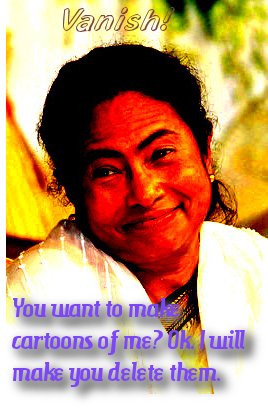I have been trying to raise awareness about the IT rules for several days now. A few people are interested. By and large, most aren’t. I have been more and more horrified that people simply don’t care about their freedoms, till I realized what the problem was, through a few chance conversations. Here is a crash course on what the IT rules do:
http://www.youtube.com/watch?v=HtA194jig3s
People don’t believe that the IT Rules really allow anyone to censor content on the Internet

There is outright disbelief. How can it be possible? How can *anyone* censor content? People are seeing the activism as hype. They think we are over reacting and that no authority will allow people making wrong complaints. There is utter cognitive dissonance on the front of lack of any authority – judicial or otherwise. How can it be possible? How can any “aira gaira nathu khaira” take down content on any website? There will be some regulation, no?
No.
There isn’t.
So what if someone just refuses?
That person ends up losing a lot of legal protections.
An offline version of this law would be to let anyone complain about any book in a library and see it banned everywhere in the country. I am not being melodramatic, this is how things are.
It seems the government wins an outrageous war for being outrageous.

The rules are so ridiculously unbelievable, that people don’t believe it, and thus aren’t feeling any particular need to stop it from happening. I mean, really… you can look at content on the net and email off a complaint to the website owner and inform that it violates any of several extremely vague conditions ranging from the garden variety “hateful” “disparaging” “offensive” etc to exotic ones line harming relations with “any” other country or harming minors in “any” way. I have rarely read such a liberal use of “any”.
No seriously. It s the same stuff.
“What kind of harm should we aim to prevent?”
Any harm.
Isn’t that broad?
“Of course. We want to be able to catch anyone we think is our enemy.”
How do we enforce it?
“we don’t! Unless we need someone to stop someone, there is no need to hassle our over burdened force!”
Risks of such rules
With these rules, all the government needs to do if media uncovers a scam is to ban the scam from being published to make it disappear.
All anyone needs to do to harass any website is to complain over content. Now think of our political, religious, class, caste differences, and predict what will happen.
The advantage to the government is that it need not take any responsibility or blame, while retaining full powers to enforce censorship to whatever degree they chose. The illusion is that they have made it very democratic, but in reality it will be anarchy, creating a nice safe zone for the government to shut down information they have an interest in.
The utter irony of this scene is that the government has created something that is so unbelievable that no one thinks it could be true. The very ridiculousness of the rules making passing it more possible.
Oh wait… we have seen such legislation in recent times….
Note: This is not an exaggeration, over reaction or paranoia. The rules are really like that. Please read.


No more comments here?
Majority is simply unconcerned about rules or regulations or laws due to ignorance plain or lethargy. Those who are knowledgeable & resourceless and in minority find it extremely difficult to challenge them legally and even if they try, rarely get higher judiciary support they themselves being hand-in-gloves with the Govt functionaries in framing such recklessly absurd rules. Further, those who are knowledgeable & are influential are reluctant to take cognizance of such atrocious acts since they are not likely be affected. However, when these mighty are adversely affected, they make hue and cry & seek legal review. Then, judiciary intervenes and laws get amended, not till then. But, the things have to change for better with highly active and pro-active social media the world over.
Actually I thought about this after we talked. The real life equivalent or offline version as your post calls it, is worse than the library example. In specifics the library example is close, but in principle this is worse. It is like a law that allows any person to punish any person based on their own, for anything that law of the land recognizes as crime. State sanctioned anarchy.
Which brings me back the original point. It may be ok to have specific criteria for taking ‘evil’ content offline. But there must be accountable authority to ‘decide if the criteria is met’. And it may even be okay to introduce some vague terms in the criteria, just so that some ‘evil doers’ don’t circumvent just based on technicalities. Such vague terms exist in the ‘offline’ freedom of expression rules as well. But there must be proper and accountable authority (accountable for fairness, above all things) to interpret those. Like the courts in the offline version. The most horrible thing this law is doing (without even being very clear about it) is letting anyone (intermediary? greivance officer) make this decision.
It not only ‘lets’ them make the decision, but even ‘pushes’ them to make the decision, criminalizing them if the fail to do this vague undefined thing that they are ‘required to do’.
That is all I have to say for now. Still haven”t read the complete IT related laws you linked to! Just this new modification proposed.
I too am stunned that people don’t realize that free speech on the net is facing such a powerful threat. I always hear stuff like “oh India has more serious problems that FoE” etc etc.
As Indians we use the Internet so much. Are we not in the least interested to fight for such a valuable resource?
And yes – the IT rules ARE INDEED that outrageous!